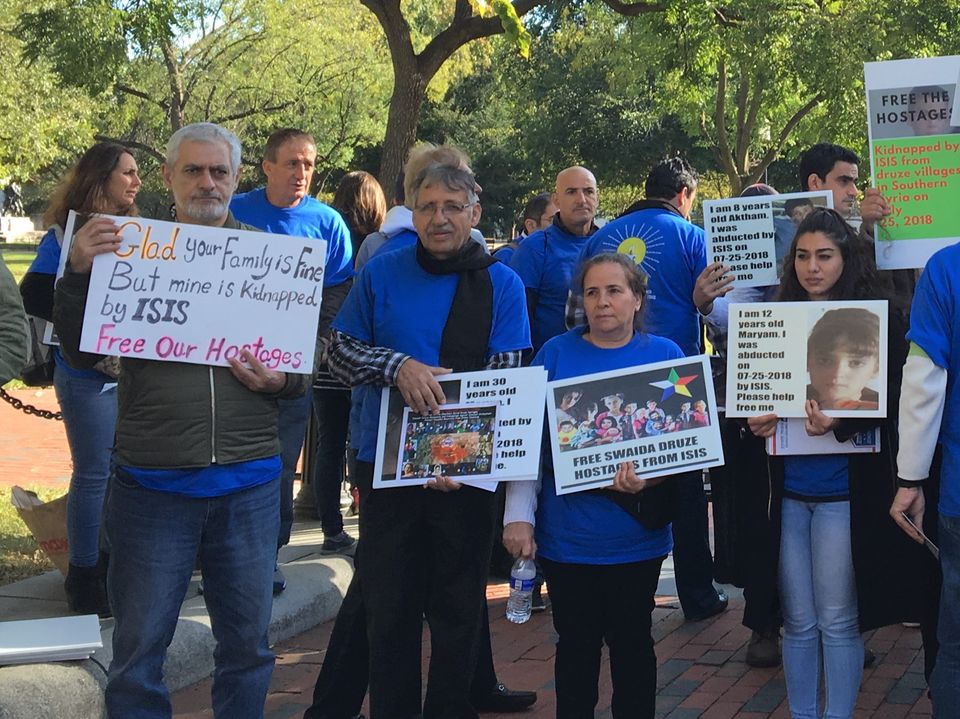
The World Must Not Ignore ISIS’s Crimes Against the Druze
A group of Druze-Americans participate in a ‘Free the Hostages’ protest at the White House in Washington, DC. Photo by SJAC.
On July 25, ISIS attacked the Druze region of Sweida in southwestern Syria, leading to the deaths of over 200 people and the kidnapping of 30 civilians. While the initial attack was covered widely in both Syrian and international media, the fate of those kidnapped, the majority of whom are women and children, has largely slipped from the public eye. Major international publications have failed to cover the unfolding story, including the brutal executions of two of the hostages, and the United States, despite its stated interests in defeating ISIS and protecting the region’s ethnic and religious minority communities, has failed to acknowledge the kidnapping, only releasing a single statement on those killed in the initial attack. This lack of attention to such a serious human rights violation is deeply concerning; the plight of the Druze hostages should be a priority of human rights organizations and the international community.
On Monday, a group of Druze-Americans gathered in front of the White House in Washington, DC to raise awareness of the kidnappings and ask the US government to speak out on the issue. Protesters wearing ‘Free Our Hostages’ t-shirts expressed their frustration with the lack of international attention that has been given to the issue, saying that they did not understand the reason for this disinterest. Earlier this month, the Nobel Committee awarded Nadia Murad the Nobel Peace Prize for her tireless work to address ISIS’s use of sexual violence against the Yazidi minority, and the US-led coalition against ISIS is still active in its pursuit of ISIS members. Yet, outrage against ISIS’s past crimes has not translated into media coverage of the situation in Sweida, widespread condemnation of ISIS’s hostage taking, or solidarity campaigns by human rights groups.
The Druze community makes up a small portion of the Syrian population, an estimated 3 percent; however, during the conflict they have experienced unique threats and violations which must be thoroughly documented, and ultimately integrated into a transitional justice process. The community has been a target of extremist groups, which view them as heretics. In 2015, the Al Qaeda-linked Al Nusra Front killed tens of Druze in Idlib, and ISIS has forced Druze communities in the north to publicly disavow their faith or face death. In one issue of its propaganda magazine, Dabiq, ISIS explains that Druze are infidels and that “their women can be taken as slaves and their property can be seized. They are apostate heretics whose repentance cannot be accepted. Rather they are to be killed where ever they are found and cursed as they were described . . .” This horrific language, similar to how ISIS discusses Yazidis and other religious minorities, is a reminder of the unique, existential threat that extremism in Syria has posed to certain minority communities, including the Druze. When designing future justice mechanisms, it will be integral to ensure that the concerns of the Druze and other minority communities are heard and integrated. Such a process will not only ensure that justice is inclusive of all groups, but can also be an important aspect of national reconciliation, by helping other Syrian communities better understand how the Druze and other marginalized communities experienced the conflict.
The July attack has devastated the Druze community in Sweida, with many survivors having lost multiple family members. In the almost three months since the kidnapping, families and friends in Sweida have worked tirelessly for their release. After the most recent execution, they announced an open-ended sit-in in front of the local provincial building, where negotiations are underway. The protests ended on the sixth day, when participants were attacked by a local armed group that is supportive of the government. The same activists regularly update a Facebook page with a running tally of the number of days the kidnapped have been held. Earlier this month, six of the hostages, two women and four children, were released, the first success in the ongoing negotiations to secure the hostages’ freedom. Another 20 women and children remain in ISIS custody.
SJAC shares the concern of these activists, and urges fellow documentation organizations and the media to shine a light on the violations and threats experienced by the Druze community, and specifically the plight of the remaining hostages. Future justice processes must strive to be inclusive of all communities within Syria. While many violations committed throughout the conflict have cut across different communities, other groups have been uniquely targeted. By highlighting the experience of the Druze community in Syria today, documenters and activists can ensure that these violations are understood, increasing the chance that they are addressed in future justice processes.
For more information or to provide feedback, please contact SJAC at [email protected] and follow us on Facebook and Twitter.